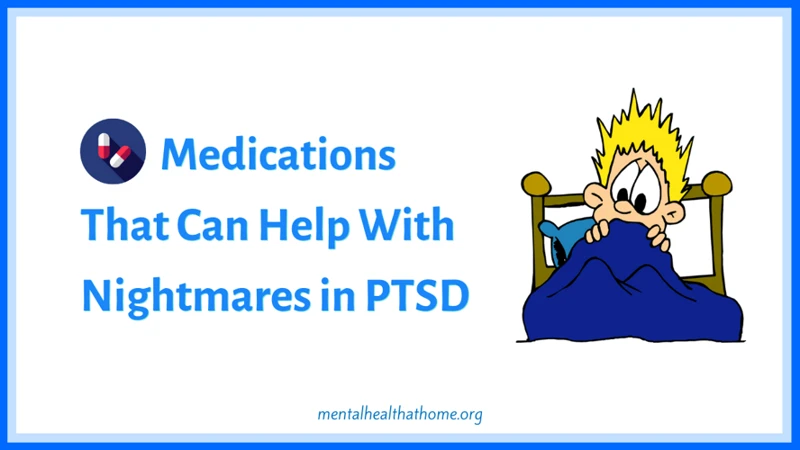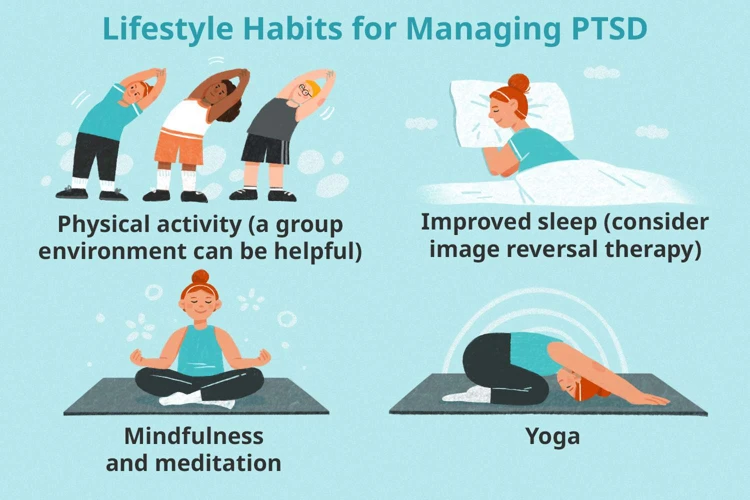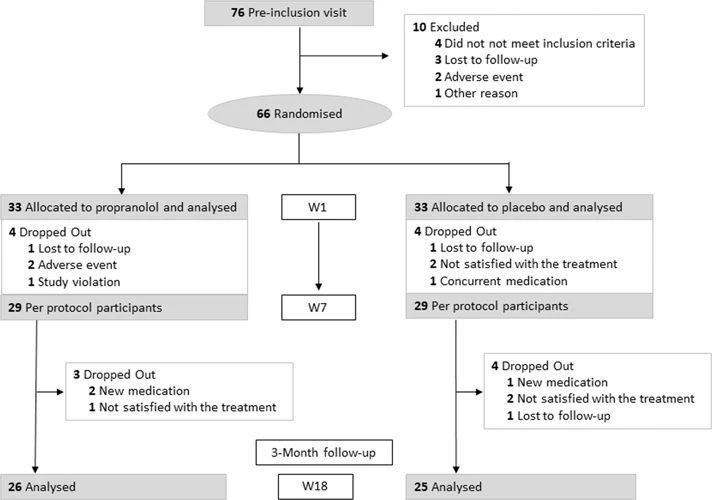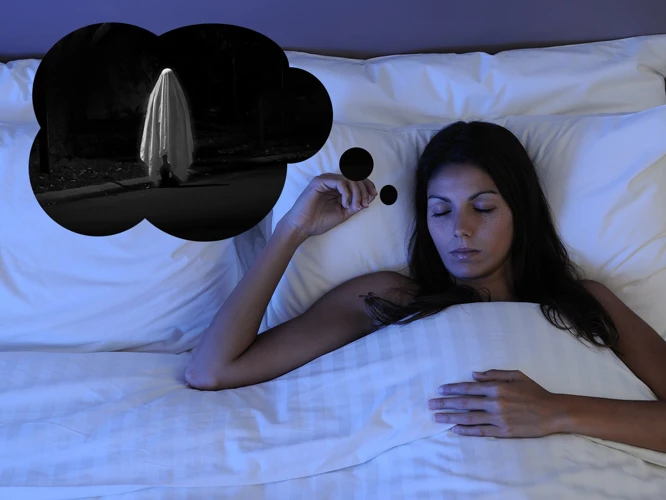When we close our eyes at night, we hope to rest peacefully and wake up feeling refreshed. However, for some individuals, sleep is disturbed by nightmares that leave them feeling uneasy, anxious, and exhausted. Nightmares can be a source of distress, leading to long-term effects on mental and physical health. While therapies like breathing techniques, counseling or lifestyle changes can help, sometimes medication is necessary to manage the impact of nightmares. In this article, we will explore the different medications that can help reduce the frequency and intensity of nightmares, as well as their potential side effects, so you can be empowered to decide what’s best for your dream life.
Nightmares 101

Nightmares are a perplexing and puzzling phenomenon that has puzzled humanity for centuries. They are defined as intensely unpleasant dreams that often wake the sleeper with feelings of fear, anxiety, and distress. Nightmares can be vivid and terrifying, causing the person to question if they were real or imagined. When it comes to the impact of nightmares, the effects are far-reaching and can impair a person’s quality of life. Let’s take a closer look at the definition of nightmares and their impact on our wellbeing.
Definition of Nightmares
Nightmares are frightening and upsetting dreams that can disturb your sleep and overall well-being. They can be vivid, detailed and often feel excessively real. Nightmares usually occur during the REM stage of sleep, which is the stage of sleep where we experience the most vivid dreams. They often happen towards the end of the night, in the early morning hours. Nightmares are different from night terrors, which are characterized by sudden awakening, intense fear, and physical symptoms such as rapid heart rate and sweating.
Nightmares can be caused by a variety of factors, including stress, anxiety, trauma, and medication side effects. They can also be associated with certain medical conditions such as sleep apnea, restless leg syndrome, and post-traumatic stress disorder (PTSD). It is essential to recognize that occasional nightmares are normal, and most people will experience them at some point in their lives. However, when nightmares become frequent, severe and start to affect daily functioning, it may be necessary to seek treatment.
The Impact of Nightmares on Quality of Life
Nightmares can have a profound impact on a person’s quality of life. They can disrupt sleep, impact mental health, and interfere with daily functioning. Below is a table outlining some of the effects nightmares can have on various aspects of a person’s life:
| Life Aspect | Effects of Nightmares |
|---|---|
| Sleep | Experiencing nightmares can make it difficult to fall asleep and may lead to frequent awakenings during the night. |
| Mental Health | Nightmares can contribute to the development or worsening of anxiety, depression, and post-traumatic stress disorder (PTSD). |
| Physical Health | Frequent nightmares can lead to increased levels of stress hormones, which can have negative effects on physical health over time. |
| Emotional Regulation | Nightmares can contribute to feelings of fear, terror, and helplessness, and may make it difficult to regulate emotions during waking hours. |
| Relationships | Having nightmares can lead to irritability, mood swings, and social isolation, which can impact both personal and professional relationships. |
Clearly, the impact of nightmares can be far-reaching and affect many aspects of a person’s life. It’s important to seek effective treatment to manage these symptoms and improve overall well-being.
Non-Medicinal Approaches to Managing Nightmares

When it comes to managing nightmares, medication is not the only solution. There are non-medicinal approaches that can be just as effective, if not more so, in reducing the frequency and intensity of nightmares. These alternative methods focus on therapy, breathing techniques, and lifestyle changes, and can help individuals regain control of their dream lives. In this section, we will explore these approaches in more detail and discuss how they can be integrated into a comprehensive treatment plan for managing nightmares.
Therapy, Breathing Techniques, and Lifestyle Changes
When it comes to managing nightmares, there are various non-medicinal approaches available to individuals. These may include therapy sessions with a mental health professional, breathing techniques, and lifestyle changes that help promote relaxation and improve sleep quality.
One type of therapy that has been proven effective in treating nightmares is cognitive-behavioral therapy for insomnia, or CBT-I. This therapy involves identifying and addressing negative patterns of thinking and behavior that may be contributing to the development and persistence of nightmares. CBT-I also involves promoting healthy sleep hygiene practices and developing relaxation techniques to reduce stress and improve quality of sleep.
In addition to therapy, breathing techniques can be helpful for reducing stress and promoting relaxation. One technique commonly used is diaphragmatic breathing, also known as deep breathing. This involves taking slow, deep breaths through the nose, filling the lungs completely and then exhaling slowly through the mouth. Deep breathing can help calm the body and reduce feelings of anxiety and stress that may contribute to nightmares.
Lastly, making lifestyle changes can also have a positive impact on managing nightmares. Some of these changes include creating a calming bedtime routine, avoiding caffeine and alcohol before bed, and establishing a consistent sleep schedule to promote a healthy circadian rhythm. Additionally, creating a calm and peaceful sleeping environment by adjusting lighting, temperature, and noise levels can help improve the quality of sleep and reduce the likelihood of experiencing nightmares.
By incorporating these non-medicinal approaches into their routine, individuals can take steps towards managing their nightmares and promoting better overall sleep and mental health.
| Non-Medicinal Approaches | Description |
|---|---|
| Therapy (CBT-I) | A form of therapy that aims to identify negative thinking and behavior patterns and promote healthy sleep hygiene practices and relaxation techniques. |
| Breathing Techniques | Diaphragmatic breathing or deep breathing can help calm the body and reduce feelings of anxiety and stress. |
| Lifestyle Changes | Creating a calming bedtime routine, avoiding caffeine and alcohol, establishing a consistent sleep schedule, and creating a calm sleep environment can all promote better sleep quality and reduce the likelihood of nightmares. |
The Role of Medications in Managing Nightmares

While there are various approaches to managing nightmares, such as therapy and lifestyle changes, medication can also play a crucial role in managing this distressing symptom. Medications can help regulate the brain chemistry responsible for producing nightmares, making them less frequent and intense. It’s important to note that not all medications are effective for everyone, and they may come with potential side effects. It’s essential to discuss the benefits and risks of medication with a healthcare professional before starting any treatment regimen. In the following sections, we’ll explore how medications work to manage nightmares, the types of medications available, and their effectiveness.
Understanding How Medications Work to Manage Nightmares
When it comes to managing nightmares, medications can be a useful tool. But how do these medications work to help manage nightmares? Here are some key points to help you understand.
1. Regulating Neurotransmitters: Some medications that are used to manage nightmares work by regulating the levels of neurotransmitters in the brain. For example, antidepressants can help regulate levels of serotonin and norepinephrine, which are both involved in regulating mood and sleep patterns.
2. Reducing Anxiety: Another way medications can help manage nightmares is by reducing anxiety levels. Anti-anxiety medications, such as benzodiazepines, can help reduce the anxiety and fear associated with nightmares, which can lessen their frequency and intensity.
3. Blocking Nightmares: Certain medications can also directly block the occurrence of nightmares. Prazosin, for example, works by blocking the activation of certain receptors in the brain that can trigger nightmares.
It’s important to note that while medications can be effective in managing nightmares, they should always be used under the guidance of a healthcare professional.
Types of Medications for Nightmares
Medications for nightmares fall into several categories. While some medications are intended to manage anxiety, others are focused on managing the underlying causes of nightmares. Here are some of the most common types of medications for nightmares:
- Sleep Aids: Sleep aids are medications that can help you sleep more soundly at night. These medications can help to reduce the frequency and intensity of nightmares by promoting deeper sleep. However, it is important to note that some sleep aids can also actually cause nightmares, so it is important to consult with your doctor before beginning any new medications.
- Beta-Blockers: Beta-blockers are medications that can help to reduce anxiety and lower blood pressure. They are often used to manage nightmares and other sleep disturbances related to post-traumatic stress disorder (PTSD). Beta-blockers work by blocking the effects of adrenaline, which can help to reduce the physical symptoms of anxiety, such as a racing heart and sweaty palms.
- Antidepressants: Antidepressants are medications that are commonly prescribed for individuals who suffer from depression, anxiety, and other mental health disorders. They can also be effective in treating nightmares by regulating the levels of chemicals in the brain that are associated with stress and mood disorders.
- Antipsychotics: Antipsychotic medications are sometimes used to treat nightmares and other sleep disturbances related to PTSD. These medications can help to reduce anxiety and promote better sleep by blocking the effects of certain chemicals in the brain that are associated with stress and anxiety.
- Anti-Anxiety Medications: Anti-anxiety medications such as benzodiazepines are sometimes used to manage nightmares. These medications work by reducing feelings of anxiety and promoting relaxation. However, they can also be habit-forming, so they should be used with caution and only under the guidance of a medical professional.
It is important for individuals who suffer from nightmares to work closely with their doctors to find the best medication and dosage for their specific needs. In addition to medication, there are many non-medicinal approaches to managing nightmares that may be effective as well. Therapy, breathing techniques, lifestyle changes, and other strategies may all be helpful in reducing the frequency and intensity of nightmares.
Effectiveness of Medications for Nightmares
It’s important to understand that not all medications are equally effective in treating nightmares. Research has shown that some medications may work better than others, depending on the root cause of the nightmares and an individual’s unique circumstances.
One medication that has been found to be particularly effective is prazosin, which is commonly prescribed for individuals with Post-Traumatic Stress Disorder (PTSD). Studies have shown that prazosin can significantly reduce the frequency and intensity of nightmares, and improve overall sleep quality.
Antidepressants, such as selective serotonin reuptake inhibitors (SSRIs) and tricyclic antidepressants (TCAs), have also been used to manage nightmares. While they may not specifically target nightmares, they can help to regulate sleep patterns and reduce symptoms of anxiety and depression, which are often associated with nightmares.
Atypical antipsychotics, such as risperidone and olanzapine, have also been used in the treatment of nightmares, particularly in individuals with PTSD. They can help to reduce anxiety and hyperarousal, which are common triggers for nightmares.
Anti-anxiety medications such as benzodiazepines may also be used to manage nightmares. However, they are generally considered a second-line treatment due to the potential for dependency and other negative side effects.
It’s important to note that the effectiveness of medications can vary greatly depending on the individual and their specific circumstances. It’s always best to consult with a healthcare professional to determine the best course of treatment.
Commonly Prescribed Medications for Nightmares

For those struggling with nightmares, medications can provide relief and improve their overall quality of life. There are various types of medications available that can potentially treat nightmares, but it’s important to speak with your doctor to determine which one is right for you. In this section, we’ll explore some of the most commonly prescribed medications for nightmares and their potential benefits, along with discussing possible side effects that should be taken into account.
Prazosin
Prazosin is a medication initially designed to treat high blood pressure but has been commonly prescribed off-label for nightmares. It works by blocking adrenaline receptors, which can lower blood pressure and reduce the symptoms of PTSD, including nightmares.
| Strengths | Weaknesses |
|---|---|
|
|
It is important to note that prazosin is not a cure for nightmares. It is a tool to manage the symptoms and improve sleep quality, often as part of a comprehensive treatment plan that includes therapy and lifestyle changes. It is typically prescribed at a low dose, which is gradually increased until the desired effect is achieved.
If you are interested in taking prazosin for nightmares, it is important to talk to your doctor about its potential benefits and risks. They will need to evaluate your medical history and overall health to determine if it is a safe and appropriate treatment option for you. Regular monitoring is also necessary to ensure that the medication is working properly and not causing any adverse effects.
Antidepressants
Antidepressants are another type of medication that can be used to manage nightmares. These medications work by increasing the levels of certain chemicals, such as serotonin and norepinephrine, in the brain. By doing so, antidepressants can help regulate the sleep cycle and reduce the occurrence of nightmares.
Types of Antidepressants:
- Selective serotonin reuptake inhibitors (SSRIs)
- Serotonin-norepinephrine reuptake inhibitors (SNRIs)
- Tricyclic antidepressants (TCAs)
Effectiveness:
While antidepressants are primarily used to treat depression, they have also been found to be effective in managing nightmares. In fact, several studies have shown that SSRIs and SNRIs can reduce the intensity and frequency of nightmares in people with PTSD. TCAs have also been found to be effective, but they are typically only prescribed if other medications are not effective.
Considerations:
It is important to note that antidepressants should only be taken under the guidance of a healthcare professional. Like all medications, antidepressants can have side effects and may interact with other medications. It may take several weeks for the full effects of the medication to be felt, and abruptly stopping the medication can cause withdrawal symptoms.
If you are considering taking antidepressants for nightmares, be sure to talk to your healthcare provider about the potential benefits and risks. They can help you determine if this type of medication is right for you and monitor your progress while taking it.
Atypical Antipsychotics
Atypical antipsychotics are a class of medications originally developed to treat symptoms of schizophrenia, but have been found to be effective in treating nightmares as well. These medications work by balancing levels of neurotransmitters in the brain, specifically dopamine and serotonin.
Some examples of atypical antipsychotics commonly used for nightmares include quetiapine and olanzapine. These medications have shown promising results in reducing nightmare frequency and intensity in patients, particularly those with post-traumatic stress disorder (PTSD).
While atypical antipsychotics can be effective in treating nightmares, they also come with potential side effects. These may include weight gain, sedation, and increased risk of diabetes and high cholesterol. As with any medication, it is important to weigh the potential benefits against the potential risks before starting treatment.
If your doctor recommends an atypical antipsychotic for your nightmares, they will closely monitor your symptoms and any side effects that may occur. It is important to follow their instructions and report any concerning symptoms or changes in mood to them right away.
Other options, such as therapy and non-medicinal approaches, should also be considered and discussed with your doctor before starting any medication for nightmares. Together, you can work towards finding the best treatment plan for managing your symptoms and improving your quality of life.
Anti-Anxiety Medications
Anti-anxiety medications, also known as anxiolytics, are often used to manage nightmares. These medications work by reducing the level of anxiety in one’s body and promoting relaxation, which can help to decrease the frequency and severity of nightmares. Some commonly prescribed anti-anxiety medications for nightmares include benzodiazepines, such as clonazepam and lorazepam, and buspirone.
| Medication | Brand Name | How it Works | Possible Side Effects |
|---|---|---|---|
| Benzodiazepines | Xanax, Valium, Ativan, Klonopin | Enhance the effects of GABA, a neurotransmitter that slows down brain activity and promotes relaxation | Drowsiness, dizziness, confusion, memory problems, dependency, withdrawal symptoms |
| Buspirone | Buspar | Stimulate serotonin receptors, which can help to reduce anxiety and promote relaxation | Dizziness, headaches, nausea, nervousness, excitement, insomnia |
Benzodiazepines are fast-acting and commonly prescribed for the short-term management of anxiety and panic disorders, as well as insomnia. However, they can be habit-forming and may cause withdrawal symptoms if stopped abruptly. Buspirone, on the other hand, is non-habit forming and is often prescribed for long-term management of anxiety disorders. It may take several weeks for buspirone to take effect, but it has fewer side effects compared to benzodiazepines.
It’s important for individuals to talk to their healthcare provider about any concerns they may have regarding anti-anxiety medications. They should also be aware of possible side effects and report any unusual symptoms to their healthcare provider promptly.
How to Talk to Your Doctor About Medications for Nightmares

When considering medications for nightmares, it is important to talk to your doctor first. This can feel daunting or intimidating, but there are some ways to ensure that the conversation is productive and helpful.
Prepare for the conversation. Before talking to your doctor, take some time to prepare. Write down any questions or concerns you have about medications for nightmares. Think about any symptoms you are experiencing, how they affect your daily life, and what you hope to gain from taking medication. This will help you stay focused during the conversation and ensure that all your concerns are addressed.
Be honest and open. When talking to your doctor, it is important to be honest and open about your experiences with nightmares. Share the frequency and intensity of your nightmares, as well as any other symptoms you may be experiencing, such as anxiety or depression. This will help your doctor make an accurate diagnosis and determine the best treatment approach for you.
Ask questions. If you have any questions or concerns about medications for nightmares, don’t hesitate to ask your doctor. This can include questions about the potential side effects of the medication or how long it will take to see an improvement in your symptoms. Having a clear understanding of the medication and the treatment process can help alleviate any anxiety or uncertainty you may have.
Consider your options. Your doctor may recommend different medications or treatment approaches for your nightmares. Take the time to consider your options and ask any questions you may have about the different medications or treatment methods. Your doctor can work with you to determine the best treatment plan for your specific needs and preferences.
Follow up. After starting medication for nightmares, it is important to follow up with your doctor regularly. This can help ensure that the medication is working effectively and that any side effects are being managed appropriately. Additionally, if you experience any changes in your symptoms or have any concerns about the medication, be sure to contact your doctor right away.
Talking to your doctor about medications for nightmares can be a helpful step in managing your sleep and improving your overall quality of life. By being prepared, honest, and open, you can work with your doctor to determine the best treatment approach for your specific needs.
Possible Side Effects of Medications for Nightmares
It is important to note that while medications can be effective in managing nightmares, they also carry potential risks and side effects. This is why it is crucial to carefully consider the benefits and drawbacks of medication and discuss these concerns with a healthcare professional before making a decision.
One possible side effect of medications for nightmares is drowsiness. This can occur with medications such as prazosin, which affects blood pressure and can cause fatigue or sleepiness. Individuals taking these types of medications should use caution when operating heavy machinery or driving.
Another possible side effect of medications for nightmares is the risk of increased anxiety or agitation. This is more commonly seen when taking antidepressants, which may cause an initial increase in symptoms before stabilizing. It is important to discuss any concerns about increased anxiety or agitation with a healthcare professional.
Some medications for nightmares may also cause changes in appetite or weight. This may be seen with atypical antipsychotics, which can cause increased hunger or cravings. It is important to be aware of these potential changes and discuss any concerns with a healthcare professional.
In rare cases, medications for nightmares may also cause allergic reactions or interactions with other medications. If any unusual symptoms or side effects occur while taking medication for nightmares, it is important to seek medical attention immediately.
While there are potential risks and side effects associated with medications for nightmares, they can also be a valuable tool in managing chronic nightmares. By carefully considering the benefits and drawbacks, and discussing concerns with a healthcare professional, individuals can make an informed decision about whether medication is the right choice for managing their nightmare symptoms.
Conclusion
In conclusion, managing nightmares can be a daunting task, but it is essential for improving the quality of life. Non-medicinal approaches such as therapy, breathing techniques, and lifestyle changes can be effective for some individuals. However, some people may require medications for better management of their nightmares.
It is crucial to understand how medications work, their types, and their potential side effects before considering them as a treatment option. Consulting with a doctor and having an open and honest conversation about the symptoms and concerns is important. The doctor can help identify the best course of treatment.
Several medications are commonly prescribed for nightmares, including Prazosin, antidepressants, atypical antipsychotics, and anti-anxiety medications. Each medication has its unique benefits and side effects, and the doctor can help decide which one is most suitable.
While medications can be effective in managing nightmares, possible side effects should be taken seriously. Regular follow-ups with the doctor can help monitor the effectiveness of the treatment and the occurrence of any side effects.
Nightmares can be challenging, but they do not have to take over one’s life. With the right approach and treatment, it is possible to improve the quality of sleep and enjoy a better quality of life.
Frequently Asked Questions
Can nightmares be a sign of a medical condition?
Yes, nightmares can be a symptom of various medical conditions such as PTSD, anxiety disorders, and sleep disorders.
What is the first step in managing nightmares?
The first step is to identify any underlying causes and try non-medicinal approaches such as therapy, breathing techniques, or lifestyle changes.
Are medications for nightmares safe?
Medications for nightmares can have side effects, but they are generally safe when taken under medical supervision.
Can over-the-counter sleeping pills be used to manage nightmares?
No, most over-the-counter sleeping pills do not address the root cause of nightmares and can actually worsen them.
Can antidepressants be used specifically to treat nightmares?
Yes, certain antidepressants such as tricyclics and selective serotonin reuptake inhibitors (SSRIs) have been used to manage nightmares.
What is the success rate of prazosin in managing nightmares?
Prazosin has shown to be effective in reducing the frequency and intensity of nightmares in up to 70% of patients.
How long does it usually take for medications to start working on nightmares?
It varies depending on the medication, but it can take a few weeks for the full effects to be seen.
Can I stop taking medication for nightmares once the nightmares have stopped?
No, it is important to continue taking medications as prescribed to prevent the return of nightmares.
Can children be prescribed medication for nightmares?
It is possible, but medications for nightmares are usually only prescribed for children experiencing severe nightmares that significantly impact their quality of life.
Is it ok to combine medications for nightmares with other medications?
It depends on the specific medications being used, so it is important to consult with a doctor before combining medications.








